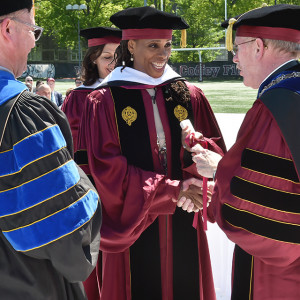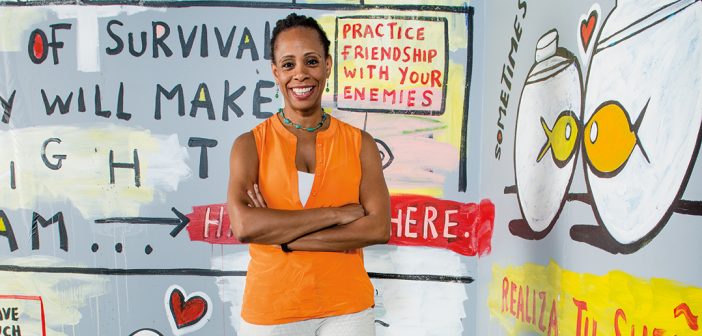The chair is named for the late James Dumpson, a social worker, professor, and administrator who served as dean of GSS from 1967 to 1974. He began his career as a children’s caseworker and rose to become New York City’s first Black welfare commissioner in 1959. Like Dumpson, Williams-Isom has focused her career on helping children thrive.

“For me to be able to come back [to Fordham] and really think about service and what it means to serve the most vulnerable is an honor. Put that together with Professor Dumpson’s vision—and as an African American woman—I think he would be super proud to see me in this position,” said Williams-Isom, who is stepping down from her post at the Harlem Children’s Zone (HCZ) at the end of this month after six years as CEO.
Williams-Isom was raised in Queens by a single mom who always stressed the value of a good education. After completing her bachelor’s degree in psychology and political science at Fordham College at Lincoln Center, she went on to graduate from Columbia Law School. But she has seen the toll that crises and a lack of resources can take on a community’s children, and she is acutely aware of how the right support could propel young people and their families out of poverty.
On her return to Fordham in the Dumpson Chair, she will work with faculty and students to develop research, programs, and policy analyses that improve services to at-risk children and families. She’ll also develop a collaboration between the Graduate School of Social Service, Fordham Law School, and the Gabelli School of Business to create a leadership institute for students, practitioners, and agency leaders committed to change around issues of race and justice. She will also continue on as a member of the University’s President’s Council.
“GSS has gained an experienced, caring, and creative leader in Anne Williams-Isom,” said Debra M. McPhee, Ph.D., dean of the Graduate School of Social Service. “Her extensive knowledge of the needs of children and families has served to elevate the voices of New York City’s most vulnerable communities. We are proud to have such an outstanding partner in advancing the school’s commitment to racial and social justice.”
For Williams-Isom, connecting children’s services with other social services has been a constant throughout her career. At the Harlem Children’s Zone, she runs innovative “cradle to career pipeline” programming that aims to break the cycle of intergenerational poverty. From life-shaping early childhood, education, and career programs to community outreach and wellness initiatives, HCZ focuses on creating opportunities for children, families, and communities to thrive.
Before joining HCZ, she advised them on integrating neighborhood-based nonprofits into the schools. At the time she was deputy commissioner of New York City’s Administration for Children’s Services, a post she rose to after 13 years in a variety of leadership roles at the agency.
Child welfare isn’t about taking children out of bad homes, she said, it’s about providing parents with the support they need to raise kids safely and give them access to opportunities. To that end, bringing social services closer to the classroom is key.
Williams-Isom noted that while the COVID-19 pandemic has proved challenging for families, attendance at HCZ remains high, with 95% of elementary and high school students signing in remotely from home. She said the participation speaks to the desire of parents to be involved in their children’s education.
“Even with this, parents were sitting with their kids, learning, finding out resources in the community so that they could provide for their families because they don’t want a learning loss for their children,” she said.
She said that she plans to take a similar holistic approach toward educating social workers at Fordham. And as a lawyer, she knows that social workers don’t have a monopoly on social justice issues. She looks forward to mingling with future lawyers from Fordham Law, future nonprofit leaders at the Gabelli School of Business, and, of course, future teachers from the Graduate School of Education.
“I’ve been talking for years about a holistic approach to our children and families,” she said. “I can quietly say, I think attending to somebody’s spirit is very important, especially with the trauma that we have seen, based on the policies under which disenfranchised folks have had to live in this country.”
Williams-Isom is currently pursuing her doctorate of ministry. She said that she is pleased to be teaching at a Jesuit institution where cura personalis, care for the whole person, includes the spirit.
“I’m excited about being able to speak to people’s spirit and the soul work that each one of us needs to do in order to bring about real change in this country,” she said.
“Jesus was a revolutionary and he was working with the disenfranchised,” she said. “But this is less about preaching and more about using our voices to call out injustices where we see them, and inviting people to be a part of the solution.”

